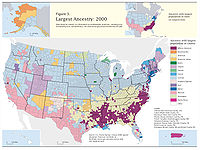German American
From Wikipedia, the free encyclopedia.
German Americans are citizens of the United States of German ancestry. Around 8 million German immigrants have entered the United States since its inception, with the majority arriving between 1840 and 1920). German immigrants arrived for a wide variety of reasons. Some came seeking religious or political freedom, others for economic opportunities greater than those in Germany, and others simply for the chance to start afresh in the New World.
Contents |
First German Americans
German immigrants made up a substantial population of colonial Pennsylvania, where they often came into political conflict with the Quakers. The first German settlement in Pennsylvania was founded in 1683, although some Germans were already in America in other colonies at that time. Eventually, Germans would constitute about one-third of the population of Pennsylvania at the time of the Revolution.
A large German colony in Virginia called Germanna was located near Culpeper and was founded by two waves of colonists in 1714 and 1717. Many of these colonists were essentially hijacked to Virginia in questionable circumstances relating to Lt. Governor Alexander Spotswood, having intended to go to Pennsylvania. Many Germanna decendents took part in the Revolution and later were on the forefront of migration west to Kentucky and beyond.
In the 1790 U.S. census, the first taken by the new country, Germans are estimated to have constituted nearly 9% of the white population in the United States.
German Americans throughout the country
Heavy German immigration to the United States occurred between 1848 and World War I, during which time nearly 6 million Germans immigrated to the U.S. The Germans became widespread throughout the Northern half of the country, especially the Midwestern states.
By 1900, the cities of Cleveland, Milwaukee, Hoboken and Cincinnati all had populations which were over 40% German. The Over-the-Rhine neighborhood in Cincinnati was one of the largest German-American cultural centers.
Present Population
German Americans are the largest self-reported ethnic group in the United States today.
According to the 2000 U.S. census, 47 million Americans are of German ancestry. German-Americans represent 16% of the total U.S. population and 24% of the non-Hispanic white population.
Of the four major U.S. regions, German was the most-reported ancestry in the Midwest, second in the West, and third in the Northeast and South regions. German was the top reported ancestry in 23 states, and it was one of the top five reported ancestries in every state except Maine and Rhode Island.
Amish, Mennonite and Hutterites
Many communities of Amish, Mennonites and Hutterites still speak dialects of German, including Pennsylvania German. Because of their religious beliefs, they form separate communities that are still functioning, in some cases centuries after their ancestors' immigration to America.
German Americans and World War I
During World War I, German Americans, especially those born abroad, were widely accused, by Americans of other ancestries, of being sympathetic to the German Empire. Many Germans were persecuted. Some Germans during this time "Americanized" their names (e.g. Schmidt to Smith) and limited their use of the German language in public places. German music of any kind ceased to be played. Laws were passed to ban the use of German as a language of instruction for elementary school students, even in private and parochial schools. Previously, bilingual schools had been common in German communities. Some communities banned instruction in any language except English. The U.S. Supreme Court ruled the ban illegal in 1923 (Meyer v. Nebraska), by which time the nativist hysteria had largely subsided. However, the ground that had been lost was never regained.
German Americans and World War II
After Adolf Hitler declared war on the United States over 11,000 Germans and German-Americans were sent to internment camps. Of these, most were released soon after the war but some were held up to 1950. President Franklin D. Roosevelt persuaded several Latin American nations to send their German aliens to the American camps. Many alien internees, including Jewish internees, were sent back to Germany in exchange for Americans in Germany, including their American born spouses and children. Some of those sent back to Germany were killed during the war.
German-American Influence
Germans have contributed to a vast number of areas in American culture and technology. Baron von Steuben, a former Prussian officer, led the reformation of the U.S. Army during War for Independence and helped make the victory against British troops possible. The Studebakers built large numbers of wagons used during the Western migration. Carl Schurz a refugee from the unsuccessful first German democratic revolution of 1848 (see also German Confederation), served as U.S. Secretary of the Interior.
Due to the tragic developments in Germany leading from World War I to World War II, many researchers of German origin left Germany due to economic problems or as a result of racial, religious, and political persecution. Probably the most famous of them was Albert Einstein, known for his Theory of Relativity.
After World War II, Wernher von Braun, the leading engineer from the former German rocket base Peenemünde, was brought to the U.S. He contributed to the development of U.S. military rockets, as well as of rockets for the NASA space program. It is widely believed that without von Braun and the other German scientists, America's space program would not have succeeded.
The influence of German cuisine is seen throughout the country. Hamburgers, bratwurst, sauerkraut, strudel are common dishes. Germans were important in the beer and wine industries. German bakers introduced the pretzel. See also Lager Beer Riot.
German-American presidents
There have been two presidents of the United States of America who were of German ancestry. One was World War II General Dwight Eisenhower (his original family name was Eisenhauer), the other was Herbert Hoover (original family name Huber).



